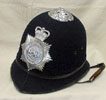COUNTRY LIFE Manifesto: More local police
Rural areas have an increasing problem with crime, but unfortunately the Government doesn't want to encourage police in villages and rural connurbation. This needs to change, says Country Life.


In 1993, Country Life ran its award-winning Campaign Against Rural Crime. We had noticed that levels of crime were rising faster in the countryside than in towns, and although country areas were?and still are?statistically safer than the cities, and some of the crimes being perpetrated in villages would hardly feature on The Bill (the theft of a tea urn from a cricket pavilion, for example), the trend was disturbing.
It had to be nipped in the bud. To judge from the British Crime Survey, this has happened. After an acceleration in the late 1980s to the mid 1990s, the rate of increase in rural crime now more or less matches that in towns. But among some groups, particularly the elderly, the fear of crime remains. However, disproportionate it may be from the reality, it makes life miserable for people who hardly dare go outside. What villagers most need is reassurance?that, and an authority figure who can administer a telling-off at a strategic moment, so that the youth who has been caught vandalising a fence does not go on to steal a car. Bring back the village bobby.
Local bobbies have made a startling reappearance in London. They do not look very much like Dixon of Dock Green in their cycling helmets, yellow vests and shorts. But they are an updated equivalent. Their mountain bikes, strong enough to go down staircases at full speed, are an efficient means of giving chase. These policemen provide a deterrent to the misbehaved and a friendly point of contact for the community. Ironically, it is rather easier?or more cost-effective?to provide this sort of local policing in cities than in country areas.
All too often, the only glimpse that villagers have of a police officer is when they see him driving past in a patrol car. This makes them reluctant to report, for example, a gate being kicked down, for which the officer has to drive miles?only to arrive long after the perpetrators have left. As a result, yobs go unreprimanded; the frail cower behind their doors. Villages need a visible police presence. Would that there could be a return to policemen living in police houses: these were sold off when forces discovered that they could no longer recruit policemen to live in them. At the time, rural policing was not considered to be a route to promotion, and rented accommodation seemed second best in what was becoming a property-owning democracy.
We do not know whether the same values would pertain in the present age, with its emphasis on work/life balance combined with exorbitant property prices in rural areas. Alas, nearly all police houses have gone. We must find alternatives. One we ourselves proposed in 1993 is the parish constable, who has the powers and training of a special constable?tantamount to that of a full-time officer. Like the special, he or she is a volunteer. But where specials are sent to wherever the police managers need support?policing football matches, for example?the parish constable is a local figure, perhaps working only a few hours a week. Parish constables work only in their local area.
They know the times when trouble generally takes place. The idea was
taken up by the then Home Secretary, Michael Howard. After 1997, the scheme ran into the sands: Labour instinctively dislikes volunteering. But the parish constable is not entirely extinct: about 150 of them survive in Kent.
Sign up for the Country Life Newsletter
Exquisite houses, the beauty of Nature, and how to get the most from your life, straight to your inbox.
The Liberal Democrats have come up with a similar scheme: the retained police officer. This would be an individual who would be contracted to serve in an area for a certain number of hours a week, the model being that of retained firemen. In return for an honorarium, he or she would also be ready for service in case of need. The Church of England was, faute de mieux, effective in extending the reach of its clergy by forming ministry teams, many of whose members are not ordained. Police forces should take note. They cannot be allowed to leave villages undefended.
Country Life is unlike any other magazine: the only glossy weekly on the newsstand and the only magazine that has been guest-edited by HRH The King not once, but twice. It is a celebration of modern rural life and all its diverse joys and pleasures — that was first published in Queen Victoria's Diamond Jubilee year. Our eclectic mixture of witty and informative content — from the most up-to-date property news and commentary and a coveted glimpse inside some of the UK's best houses and gardens, to gardening, the arts and interior design, written by experts in their field — still cannot be found in print or online, anywhere else.
-
 About time: The fastest and slowest moving housing markets revealed
About time: The fastest and slowest moving housing markets revealedNew research by Zoopla has shown where it's easy to sell and where it will take quite a while to find a buyer.
By Annabel Dixon
-
 Betty is the first dog to scale all of Scotland’s hundreds of mountains and hills
Betty is the first dog to scale all of Scotland’s hundreds of mountains and hillsFewer than 100 people have ever completed Betty's ‘full house’ of Scottish summits — and she was fuelled by more than 800 hard boiled eggs.
By Annunciata Elwes